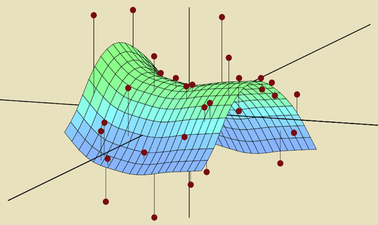Inferential Statistics Courses
Take free online inferential statistics courses to understand the process of testing hypotheses and deriving estimates from a population.

learn inferential statistics
Inferential Statistics Definition
Statistics play a critical role with research methods and data sets in today's world. The definition of inferential statics is the random sample of data from a larger population to make judgments of a probability from statistical analysis. This data analysis measures ANOVA (analysis of variance) to examine the differences of means of a population parameter. It's generally difficult to gather the confidence intervals or sample data from an entire population, so analyst tend to use inferential statistics to help explain the probability. This form of analysis can be contrasted with descriptive statistics.
Inferential Statistics vs Descriptive Statistics
These two types of analysis can be used simultaneously in research, but there are some differences between each. Both can use the mean score and standard deviation to draw conclusions from a sample size, but the final results are presented in distinctive formats. For the final results, descriptive statistics use charts, tables, and graphs. Inferential statistics, on the other hand, uses probability scores to reach conclusions.
What Fields of Work is Inferential Statistics Used?
The practice of inferential statistics helps explain situations and or predict what events will happen. This type of analysis can be used in a wide range of fields including but not limited to banking, machine learning, AI, IT personnels, engineer, academics, and more. In business, you can use this type of analysis to measure a small sample of data to predict future sales, customers, finding new markets, and more. Even sports team in today's age are using data predictions to make business and on-field decisions.
Billy Beane (the former General Manager of the Oakland Athletics) made data analysis and predictions famous in sports. His team looked at sample statistics of players most teams would overlook due to their name, age, or some other irrelevant factor. His team used sampling strategies to help build a playoff Baseball team on one of the league's smallest payroll. Bill Beane changed the game of baseball by having a team use statistical methods to help predict what would make them win. This strategy has been incorporated by countless teams in and outside of baseball to better save resources while delivering a winning formula on the field.
Inferential Statistics Online Courses
Berkeley offers a self-paced course in the foundations of Data Science with Inferential Thinking by Resampling. In this course, you will learn how to use inferential thinking to draw conclusions surrounding data in random samples. Other aspects of this course include how to conduct null hypothesis testing, permutation testing, regression analysis, analysis of data, and A/B testing. You will also learn about p-values, quantifying uncertainty, and generating confidence intervals using the bootstrap method.
From the Harvard course, you will understand the concepts necessary to refine estimates and margins of populations to make predictions about the data. You will also learn how to use models to aggregate data from different sources. Also in this course, you will learn the basics of Bayesian statistics and predictive modeling.














